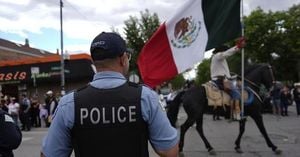Former Philippine President Rodrigo Duterte, now 80 years old, finds himself at the center of an international legal and media maelstrom as he remains in custody at the International Criminal Court (ICC) detention facility in The Hague, Netherlands. His arrest on March 11, 2025, by Philippine authorities acting on an ICC warrant, marked a historic first: Duterte is the first Philippine president and the first Asian former head of state to be detained by the ICC, according to Rappler.
Despite the gravity of the charges—crimes against humanity stemming from thousands of killings during his controversial war on drugs—Duterte's physical and mental condition in detention has become a matter of public interest and speculation. Acting Davao City Mayor Baste Duterte, his son, addressed the public on August 12, 2025, seeking to reassure supporters and the nation. "Any other person that would be in detention would be depressed and you would have trouble eating because you won’t want to eat. You would lose your appetite," Baste Duterte said, as reported by GMA Integrated News. He added, "But cognitively, he’s okay, but he’s not a young person, he’s old. He is ok physically but he has lost weight because, as how I see it, he hasn’t been eating properly due to lack of appetite."
Baste Duterte also expressed his intent to visit his father in the Netherlands, voicing frustration over the situation: "What’s being done to him now is very unjust. But, it’s ok. He is still our mayor," he remarked, invoking the elder Duterte's long tenure as Davao City's leader. "I am the acting mayor. He has been mayor here for several years already. Let’s just follow his direction as we have done so in the past. That’s what being a Davaoeño is."
The elder Duterte is currently held at the Scheveningen Prison in The Hague, awaiting a confirmation of charges hearing scheduled for September 23, 2025. The ICC case against him centers on the bloody anti-drug campaign he led as both Davao City mayor and Philippine president. Official government records acknowledge over 6,000 deaths of drug suspects during police operations, but human rights organizations estimate the true toll could reach up to 30,000, citing unreported and extrajudicial killings—a staggering figure that has drawn global condemnation and prompted the ICC's intervention.
Duterte's defense team has not been idle. Earlier in August, his lawyers filed a motion with the ICC Appeals Chamber to disqualify Prosecutor Karim Khan, alleging a "grievous conflict of interest." This legal maneuver underscores the high stakes and contentious atmosphere surrounding the case, as both Duterte's camp and the international legal community brace for the next phase of proceedings.
While the legal process unfolds, a parallel battle is raging in the court of public opinion—particularly on social media. Since Duterte's arrest, platforms like TikTok have become hotbeds for both fervent support and rampant misinformation. One viral video, for instance, claimed that Duterte had been recognized by the Guinness World Records as the "most famous and most loved detainee in world history." The video, which featured a photo of Duterte and racked up over 122,000 views, asserted that his presence at the ICC had even turned the court into a "tourist attraction." Some Filipino viewers expressed pride in the supposed recognition, with comments celebrating Duterte's global impact.
However, this claim is unequivocally false. As Rappler reports, there is no Guinness World Record entry for Duterte under any detainee-related title. In fact, Guinness World Records does not even have a category for subjective accolades like fame or popularity. The organization's policies are clear: records must be "measurable, breakable, standardisable, verifiable, based on one variable, and the best in the world." No formal application or supporting documentation for such a record has ever been filed by or on behalf of Duterte, and a search of the official Guinness database yields no results linking his name to any such achievement.
This is not the first instance of disinformation tied to Duterte's detention. Social media has also circulated a baseless story that his 80th birthday celebration set a Guinness World Record by gathering 50 million supporters worldwide—a claim that has likewise been debunked by Rappler. The proliferation of these falsehoods highlights the intense polarization and emotional investment surrounding Duterte's legal plight, as well as the challenges journalists and fact-checkers face in countering viral misinformation.
Back in the Philippines, reactions to Duterte's arrest and ongoing detention have been mixed and deeply felt. For his supporters, especially in Davao City where his political career began, the former president remains a beloved figure. Baste Duterte's statements reflect this enduring loyalty and the sense of injustice many feel over his prosecution. "He is still our mayor," Baste insisted, signaling a continued allegiance to his father's legacy and policies.
Yet, for critics and human rights advocates, the ICC case is a long-overdue reckoning for a campaign that left thousands dead and families shattered. The stark disparity between official death tolls and the estimates provided by rights groups underscores the complexity and controversy of Duterte's war on drugs. The upcoming confirmation of charges hearing on September 23 will be a crucial moment—not only for Duterte's fate but for the broader question of accountability for state-sanctioned violence in the Philippines.
The legal process at the ICC is methodical and rigorous, with the pre-trial stage designed to sift through evidence and determine whether the case should proceed to a full trial. Prosecutor Karim Khan, despite the defense's efforts to have him disqualified, remains a central figure in building the case against Duterte. The outcome of the disqualification motion could have significant implications for the proceedings, but as of now, the case moves forward.
Meanwhile, Duterte's health and well-being in detention remain a subject of concern for his family and supporters. At 80, and reportedly thinner due to a loss of appetite, the former president faces a daunting legal battle far from home. His son’s description of his mental state as "sound" but physically diminished paints a picture of an aging leader under immense stress—a humanizing detail amid the swirl of legal arguments and political rhetoric.
As the world watches, the saga of Rodrigo Duterte at the ICC encapsulates not only the complexities of international justice but also the enduring power of narrative—true or false—in shaping public perception. The next chapter will unfold in The Hague this September, with consequences that will reverberate far beyond the courtroom.




